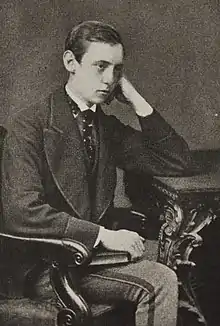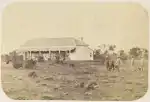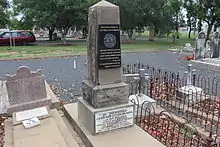Edward Dickens
Edward Bulwer Lytton Dickens (13 March 1852 – 23 January 1902) was the youngest son of English novelist Charles Dickens and his wife Catherine.[1] He emigrated to Australia at the age of 16, and eventually entered politics, serving as a member of the New South Wales Legislative Assembly from 1889 to 1894. He died in poverty at the age of 49.
Edward Dickens | |
|---|---|
 Edward Bulwer Lytton Dickens in 1868 | |
| Member of the New South Wales Legislative Assembly | |
| In office 13 February 1889 – 25 June 1894 | |
| Preceded by | New seat |
| Succeeded by | Richard Sleath |
| Constituency | Wilcannia |
| Personal details | |
| Born | 13 March 1852 London, England |
| Died | 23 January 1902 (aged 49) Moree, New South Wales, Australia |
| Relations | Six brothers and three sisters |
| Parents | Charles Dickens Catherine Dickens |
Early life
Nicknamed "Plorn", Dickens was named after novelist Edward Bulwer-Lytton and educated at Tunbridge Wells in Kent at a private school owned by the Reverend W. C Sawyer, later Anglican bishop of Armidale and Grafton. He also attended lectures at the Royal Agricultural College in Cirencester, Gloucestershire.[2][3]

Move to Australia
Charles Dickens encouraged Edward, along with his elder brother Alfred D'Orsay Tennyson Dickens, to migrate to Australia, which he saw as a land of opportunity. Alfred migrated in 1865 and Edward in 1868. Edward arrived at Momba Station just before his sixteenth birthday. Dickens settled at Wilcannia, New South Wales where he became manager of Momba Station. He married Constance Desailly, the daughter of a local property-owner, in 1880. He opened a stock and station agency, was elected as an alderman of Bourke Shire Council and bought a share in Yanda station near Bourke. He lost heavily from bad seasons and in 1886 he was appointed government inspector of runs in the Bourke District. He was never able to pay back a loan of £800 from his most successful brother, Henry.[3][4]
Parliament
Dickens nominated for the seat of Wentworth at the 1882 by-election, but withdrew before the polls, won by fellow pastoralist Edward Quin, then was elected member for Wilcannia in the New South Wales Legislative Assembly in 1889 and held the seat until defeated by the Labor Party candidate, Richard Sleath in 1894.[2]
Later life

Dickens then became a rabbit inspector for the Government of New South Wales and was afterwards an officer for the Lands Department in charge of the Moree district.[5] He subsequently had difficulty finding employment and died after several months' illness in Moree, in debt and childless.[3] He was buried in Moree cemetery.[6]
See also
Notes
| Wikimedia Commons has media related to Edward Dickens. |
- Dickens Family Tree website
- "Mr Edward Bulwer Lytton Dickens (1852-1902)". Former Members of the Parliament of New South Wales. Retrieved 13 May 2019.
- Lansbury, Coral (1972). "Dickens, Charles (1812 - 1870)". Australian Dictionary of Biography. Melbourne University Press. ISSN 1833-7538. Retrieved 8 September 2007 – via National Centre of Biography, Australian National University.
- Meacham, Steve (24 December 2002). "Dickens of a time". The Sydney Morning Herald. Retrieved 8 September 2007.
- 'The Life of Charles Dickens: His Life,Writings and Personality' By Frederic George Kitton, Published by Lexden Publishing Limited, (2004) p383, ISBN 1-904995-02-0
- "Grave Photo Link". National Library of Australia. Retrieved 9 September 2007.
| New South Wales Legislative Assembly | ||
|---|---|---|
| New seat | Member for Wilcannia 1889–1894 |
Succeeded by Richard Sleath |